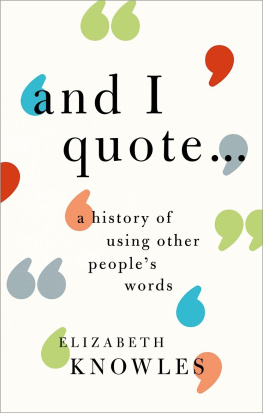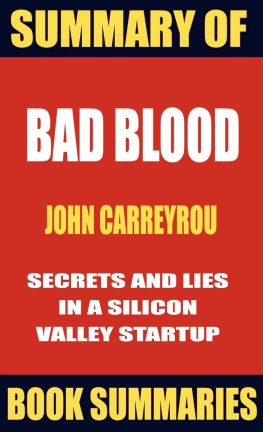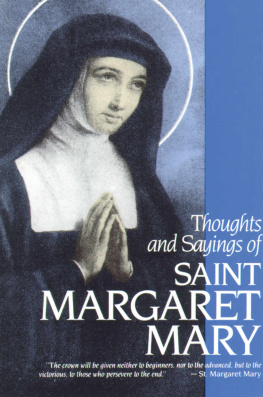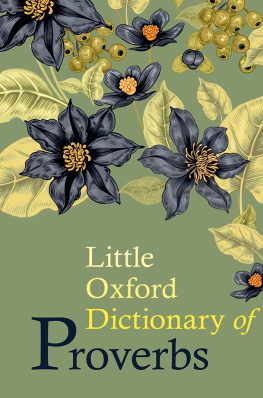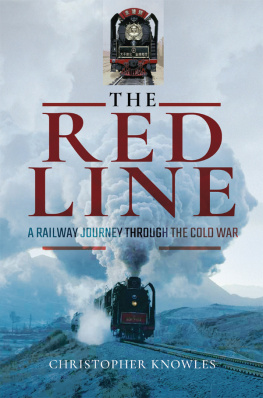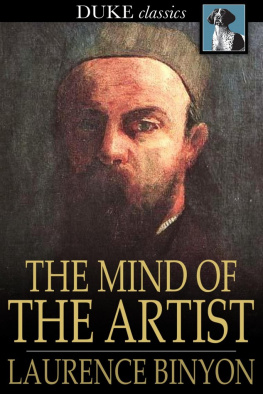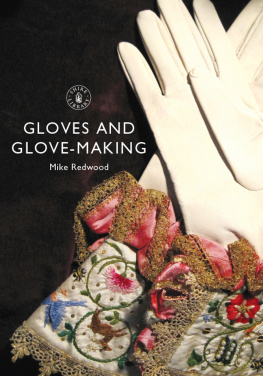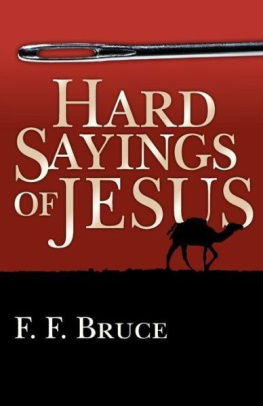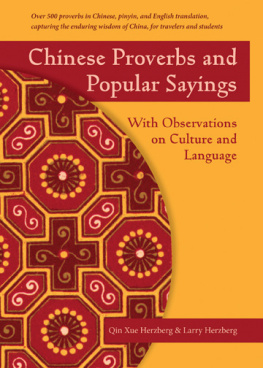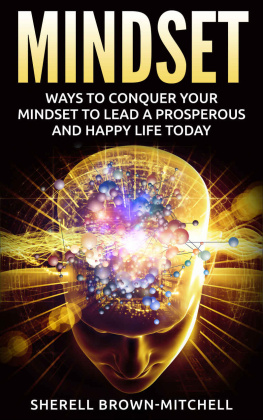What They Didnt Say
What they Didnt Say
A BOOK OF MISQUOTATIONS
Edited by Elizabeth Knowles


Great Clarendon Street, Oxford OX2 6DP
Oxford University Press is a department of the University of Oxford.
It furthers the Universitys objective of excellence in research, scholarship,
and education by publishing worldwide in
Oxford New York
Auckland Cape Town Dar es Salaam Hong Kong Karachi Kuala Lumpur
Madrid Melbourne Mexico City Nairobi New Delhi Shanghai Taipei Toronto
With offices in
Argentina Austria Brazil Chile Czech Republic France Greece
Guatemala Hungary Italy Japan South Korea Poland Portugal
Singapore Switzerland Thailand Turkey Ukraine Vietnam
Oxford is a registered trade mark of Oxford University Press
in the UK and in certain other countries
Published in the United States
by Oxford University Press Inc., New York
Oxford University Press 2006
The moral rights of the author have been asserted
Database right Oxford University Press (maker)
First published 2006
All rights reserved. No part of this publication may be reproduced, stored in a retrieval system, or transmitted, in any form or by any means, without the prior permission in writing of Oxford University Press, or as expressly permitted by law, or under terms agreed with the appropriate reprographics rights organization. Enquiries concerning reproduction outside the scope of the above should be sent to the Rights Department, Oxford University Press, at the address above
You must not circulate this book in any other binding or cover and you must impose this same condition on any acquirer
British Library Cataloguing in Publication Data
Data available
Library of Congress Cataloging in Publication Data
Data available
Printed in Great Britain by
Clays Ltd, Bungay, Suffolk
ISBN: 0199203598
ISBN: 9780199203598
1 3 5 7 9 10 8 6 4 2
Contents
Introduction
Misquotations are often more than mistakes, and much more interesting. Many of them are quotations on the move, which are becoming part of our general vocabulary. We reach for them as a kind of shorthand through which we can make reference to a person, an event, or a particular situation. Thus the desire to evoke traditional conflicts of interest in the world of publishing may still lead someone to quote the popular form of Thomas Campbells toast to Napoleon at a literary dinner: He once shot a publisher. Praise for a woman who has excelled in what has traditionally been seen as a mans world may be illuminated by reference to the comment attributed to Ginger Rogersthat she not only did everything her partner Fred Astaire did, but she did it backwards and in high heels. A reference to the white heat of technology may introduce comment on a strong belief in the effect of technological development.
The term misquotations covers a range of quoted material: wrongly remembered sayings, where the incorrect version has established its own identity, popular summaries of original thoughts, and apocryphal or unverifiable comments attributed to a particular person. Some, like Beam me up, Scotty, and Play it again, Sam, are so well-known in their own right as to have achieved iconic status. Many of them represent unconscious editing by the memory, so that we refer to the best-laid plans o mice and men rather than the best-laid schemes. Charles Hoy Forts 1931 comment, A social growth cannot find out the use of steam engines, until comes steam-engine time, is summarized and remembered as When its steam engine time, people invent steam engines. (The critic Hesketh Pearson, considering this phenomenon in 1934, added in the idiom of his time: A widely-read man never quotes accurately, for the rather obvious reason that he has read too widely.)
Bernard Darwin, in his Introduction to the first edition of the Oxford Dictionary of Quotations in 1941, considered the uses to which the Dictionary might be put:
It cannot accomplish impossibilities. It will not prevent many an honest journalist from referring to fresh fields and pastures new nor from describing a cup-tie as an example of Greek meeting Greek. There is a fine old crusted tradition of misquoting not lightly to be broken and it might almost seem pedantry to deck these ancient friends in their true but unfamiliar colours. Misquoting may even be deemed an amiable weakness, since Dickens in one of his letters misquoted Sam Weller.
Darwin did go on to say that the Dictionary might offer a good chance of avoiding the danger of misquotation, but the preceding passage suggests that he recognized the phenomenon of quotations which, in becoming part of the general vocabulary, adapt their form.
We adjust what we have heard, and sometimes build on the alteration. In J. D. Salingers 1951 novel of adolescence, The Catcher in the Rye, the narrator Holden Caulfield relates his fantasy of a game played by children running through a field of rye near the edge of a cliff. He would like to be the catcher in the rye: the person who stands on the edge of the cliff, and catches them before they fall over. The fantasy is based on his mistaken memory of a song by Robert Burns. He explains it to his sister: You know that song If a body catch a body comin through the rye? Id like. She interrupts: Its If a body meet a body coming through the rye! and continues, Its a poem. By Robert Burns. Holden admits that she is right, but adds sadly I thought it was If a body catch a body. He is reluctant to relinquish either his fantasy, or the changed wording on which it was based.
We may unconsciously edit what we remember to fit what we believe to be the essential truth about a person or an event. The misquotation then flourishes because it echoes more precisely a common assumption, or encapsulates the public profile of a particular person. A written source may confirm the opposition of events as Harold Macmillans view of the greatest difficulty for a Prime Minister, but Events, dear boy. Events catches the tone of that political personality. The supposed assertion Youve never had it so good fits with the image of Supermac as successful Premier. The insouciant I rob banks because thats where the money is evokes the public persona of the debonair American bank robber Willie Sutton, known as the Actor. If I cant dance, I dont want to be in your revolution, as addressed to a puritanical comrade, has the sparky feel of the revolutionary Emma Goldman. The ominous statement The Republic has no need of scientists catches the icy tone of the Jacobins at the time of the Terror. The injunction Pray for Shackleton (from the longer When disaster strikes, get down on your knees and pray for Shackleton), reflects the reputation for competence and effectiveness of the Antarctic explorer Ernest Shackleton. Occasionally this has presented problems: Winston Churchills choice of epithets for his Labour opponent Clement Attlee included a sheep in sheeps clothing and a modest man with much to be modest about, but he deplored the suggestion that he might have said An empty taxi drew up outside 10 Downing Street, and Attlee got out.
A small change may reflect a real difference in meaning. Advise, encourage, and warn
Next page

